Второстепенные члены предложения.ppt
- Количество слайдов: 28
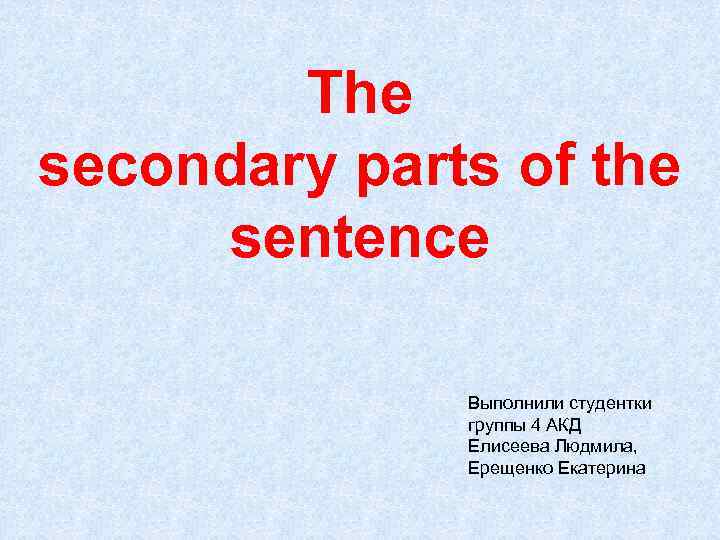 The secondary parts of the sentence Выполнили студентки группы 4 АКД Елисеева Людмила, Ерещенко Екатерина
The secondary parts of the sentence Выполнили студентки группы 4 АКД Елисеева Людмила, Ерещенко Екатерина
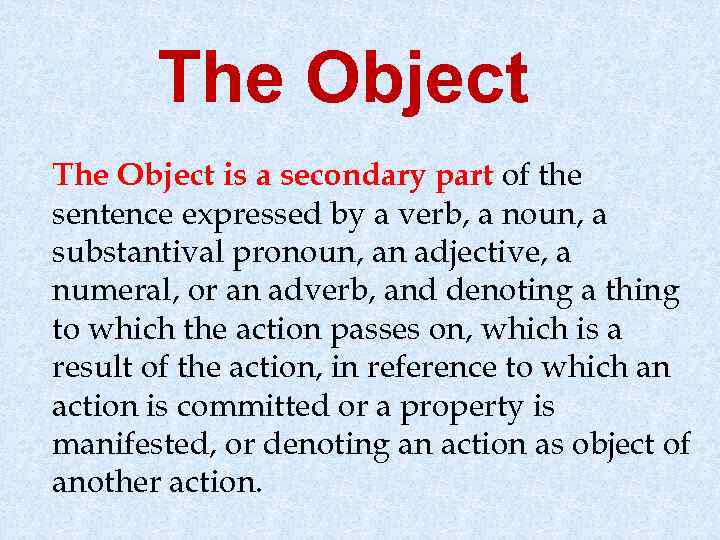 The Object is a secondary part of the sentence expressed by a verb, a noun, a substantival pronoun, an adjective, a numeral, or an adverb, and denoting a thing to which the action passes on, which is a result of the action, in reference to which an action is committed or a property is manifested, or denoting an action as object of another action.
The Object is a secondary part of the sentence expressed by a verb, a noun, a substantival pronoun, an adjective, a numeral, or an adverb, and denoting a thing to which the action passes on, which is a result of the action, in reference to which an action is committed or a property is manifested, or denoting an action as object of another action.
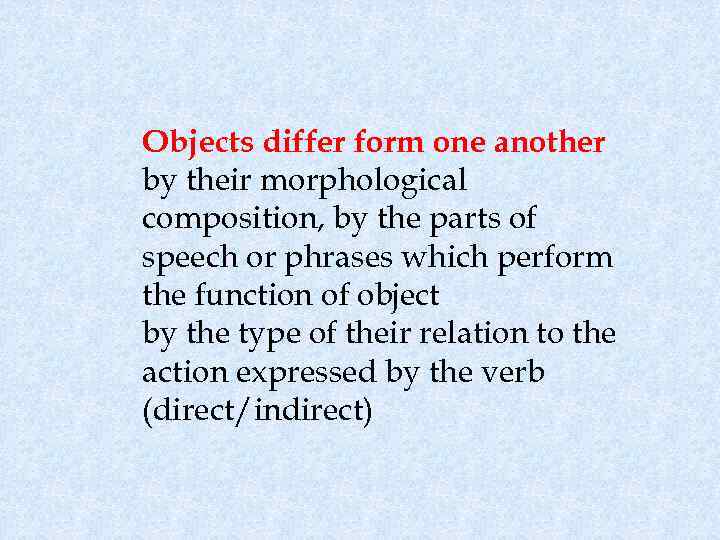 Objects differ form one another by their morphological composition, by the parts of speech or phrases which perform the function of object by the type of their relation to the action expressed by the verb (direct/indirect)
Objects differ form one another by their morphological composition, by the parts of speech or phrases which perform the function of object by the type of their relation to the action expressed by the verb (direct/indirect)
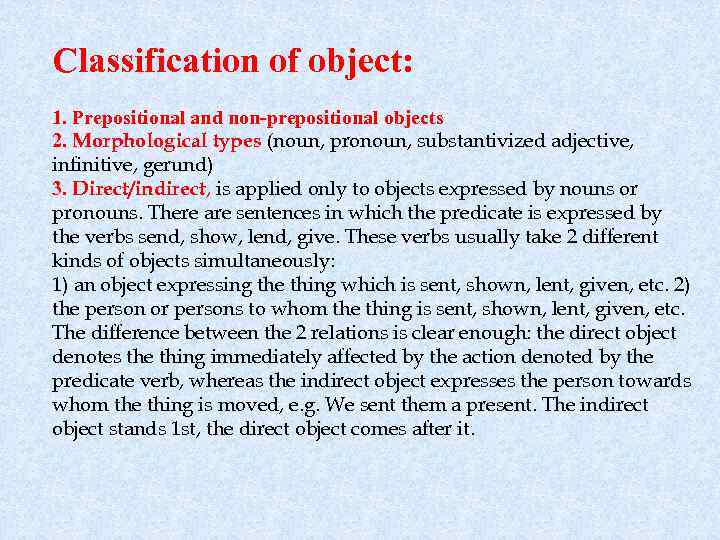 Classification of object: 1. Prepositional and non-prepositional objects 2. Morphological types (noun, pronoun, substantivized adjective, infinitive, gerund) 3. Direct/indirect, is applied only to objects expressed by nouns or pronouns. There are sentences in which the predicate is expressed by the verbs send, show, lend, give. These verbs usually take 2 different kinds of objects simultaneously: 1) an object expressing the thing which is sent, shown, lent, given, etc. 2) the person or persons to whom the thing is sent, shown, lent, given, etc. The difference between the 2 relations is clear enough: the direct object denotes the thing immediately affected by the action denoted by the predicate verb, whereas the indirect object expresses the person towards whom the thing is moved, e. g. We sent them a present. The indirect object stands 1 st, the direct object comes after it.
Classification of object: 1. Prepositional and non-prepositional objects 2. Morphological types (noun, pronoun, substantivized adjective, infinitive, gerund) 3. Direct/indirect, is applied only to objects expressed by nouns or pronouns. There are sentences in which the predicate is expressed by the verbs send, show, lend, give. These verbs usually take 2 different kinds of objects simultaneously: 1) an object expressing the thing which is sent, shown, lent, given, etc. 2) the person or persons to whom the thing is sent, shown, lent, given, etc. The difference between the 2 relations is clear enough: the direct object denotes the thing immediately affected by the action denoted by the predicate verb, whereas the indirect object expresses the person towards whom the thing is moved, e. g. We sent them a present. The indirect object stands 1 st, the direct object comes after it.
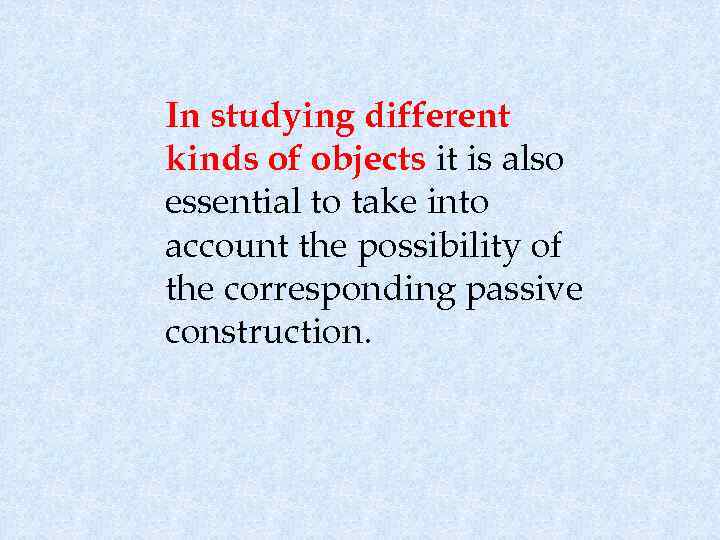 In studying different kinds of objects it is also essential to take into account the possibility of the corresponding passive construction.
In studying different kinds of objects it is also essential to take into account the possibility of the corresponding passive construction.
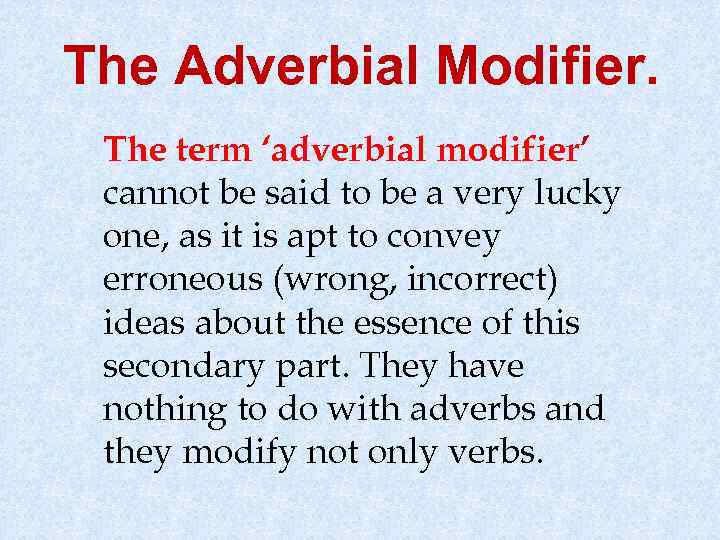 The Adverbial Modifier. The term ‘adverbial modifier’ cannot be said to be a very lucky one, as it is apt to convey erroneous (wrong, incorrect) ideas about the essence of this secondary part. They have nothing to do with adverbs and they modify not only verbs.
The Adverbial Modifier. The term ‘adverbial modifier’ cannot be said to be a very lucky one, as it is apt to convey erroneous (wrong, incorrect) ideas about the essence of this secondary part. They have nothing to do with adverbs and they modify not only verbs.
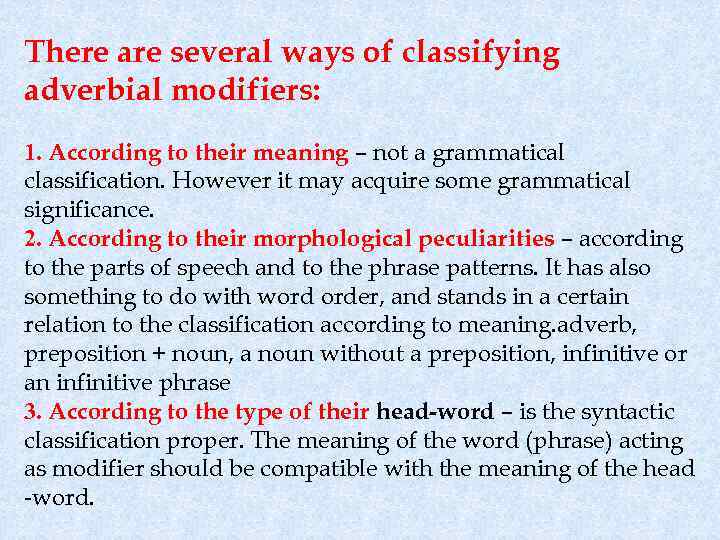 There are several ways of classifying adverbial modifiers: 1. According to their meaning – not a grammatical classification. However it may acquire some grammatical significance. 2. According to their morphological peculiarities – according to the parts of speech and to the phrase patterns. It has also something to do with word order, and stands in a certain relation to the classification according to meaning. adverb, preposition + noun, a noun without a preposition, infinitive or an infinitive phrase 3. According to the type of their head-word – is the syntactic classification proper. The meaning of the word (phrase) acting as modifier should be compatible with the meaning of the head -word.
There are several ways of classifying adverbial modifiers: 1. According to their meaning – not a grammatical classification. However it may acquire some grammatical significance. 2. According to their morphological peculiarities – according to the parts of speech and to the phrase patterns. It has also something to do with word order, and stands in a certain relation to the classification according to meaning. adverb, preposition + noun, a noun without a preposition, infinitive or an infinitive phrase 3. According to the type of their head-word – is the syntactic classification proper. The meaning of the word (phrase) acting as modifier should be compatible with the meaning of the head -word.
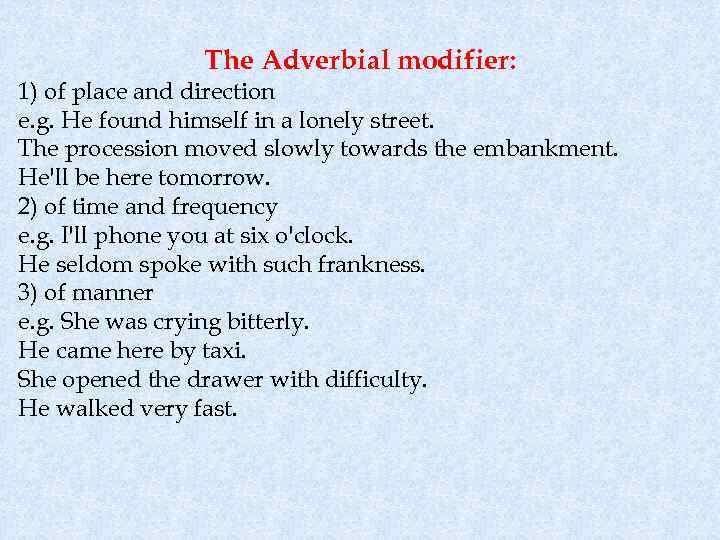 The Adverbial modifier: 1) of place and direction e. g. He found himself in a lonely street. The procession moved slowly towards the embankment. He'll be here tomorrow. 2) of time and frequency e. g. I'll phone you at six o'clock. He seldom spoke with such frankness. 3) of manner e. g. She was crying bitterly. He came here by taxi. She opened the drawer with difficulty. He walked very fast.
The Adverbial modifier: 1) of place and direction e. g. He found himself in a lonely street. The procession moved slowly towards the embankment. He'll be here tomorrow. 2) of time and frequency e. g. I'll phone you at six o'clock. He seldom spoke with such frankness. 3) of manner e. g. She was crying bitterly. He came here by taxi. She opened the drawer with difficulty. He walked very fast.
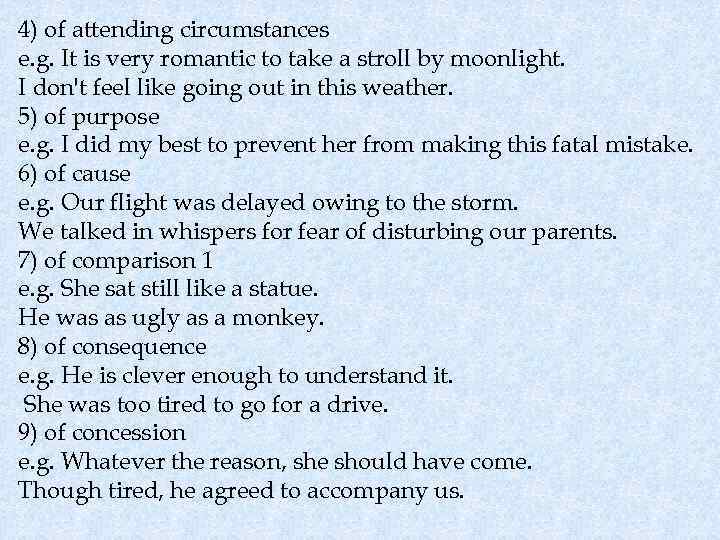 4) of attending circumstances e. g. It is very romantic to take a stroll by moonlight. I don't feel like going out in this weather. 5) of purpose e. g. I did my best to prevent her from making this fatal mistake. 6) of cause e. g. Our flight was delayed owing to the storm. We talked in whispers for fear of disturbing our parents. 7) of comparison 1 e. g. She sat still like a statue. He was as ugly as a monkey. 8) of consequence e. g. He is clever enough to understand it. She was too tired to go for a drive. 9) of concession e. g. Whatever the reason, she should have come. Though tired, he agreed to accompany us.
4) of attending circumstances e. g. It is very romantic to take a stroll by moonlight. I don't feel like going out in this weather. 5) of purpose e. g. I did my best to prevent her from making this fatal mistake. 6) of cause e. g. Our flight was delayed owing to the storm. We talked in whispers for fear of disturbing our parents. 7) of comparison 1 e. g. She sat still like a statue. He was as ugly as a monkey. 8) of consequence e. g. He is clever enough to understand it. She was too tired to go for a drive. 9) of concession e. g. Whatever the reason, she should have come. Though tired, he agreed to accompany us.
 10) of condition e. g. To look at her you wouldn't believe she was a famous actress. He said he would do it if necessary. 11) of exception e. g. He had no choice but to obey the orders.
10) of condition e. g. To look at her you wouldn't believe she was a famous actress. He said he would do it if necessary. 11) of exception e. g. He had no choice but to obey the orders.
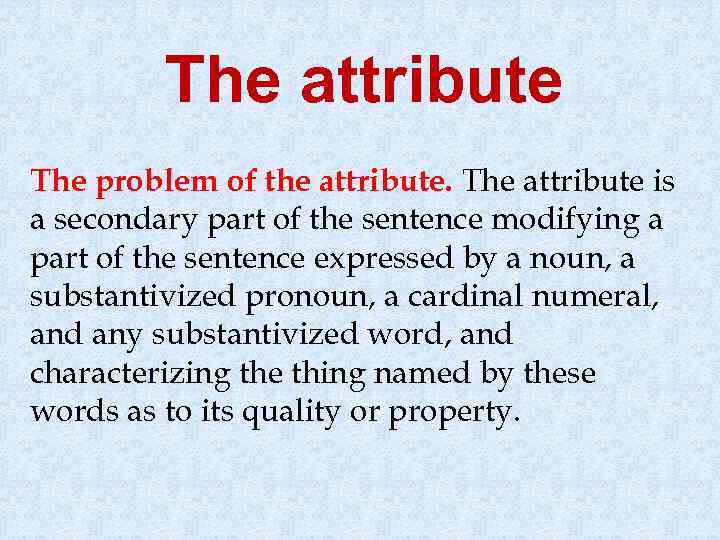 The attribute The problem of the attribute. The attribute is a secondary part of the sentence modifying a part of the sentence expressed by a noun, a substantivized pronoun, a cardinal numeral, and any substantivized word, and characterizing the thing named by these words as to its quality or property.
The attribute The problem of the attribute. The attribute is a secondary part of the sentence modifying a part of the sentence expressed by a noun, a substantivized pronoun, a cardinal numeral, and any substantivized word, and characterizing the thing named by these words as to its quality or property.
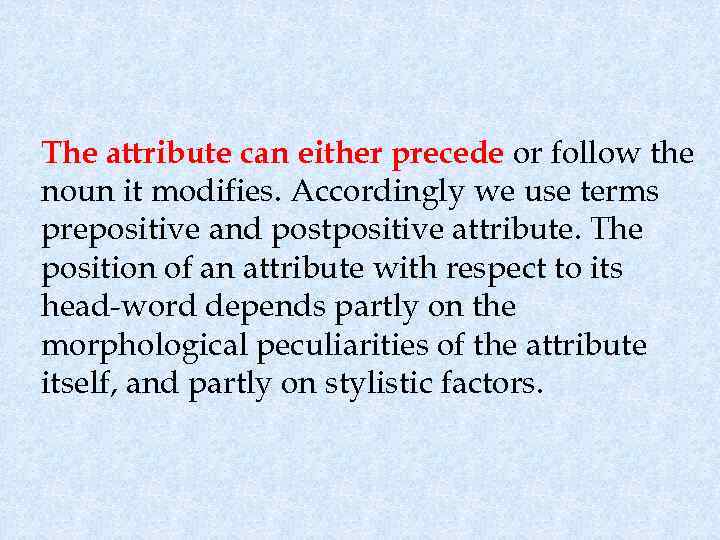 The attribute can either precede or follow the noun it modifies. Accordingly we use terms prepositive and postpositive attribute. The position of an attribute with respect to its head-word depends partly on the morphological peculiarities of the attribute itself, and partly on stylistic factors.
The attribute can either precede or follow the noun it modifies. Accordingly we use terms prepositive and postpositive attribute. The position of an attribute with respect to its head-word depends partly on the morphological peculiarities of the attribute itself, and partly on stylistic factors.
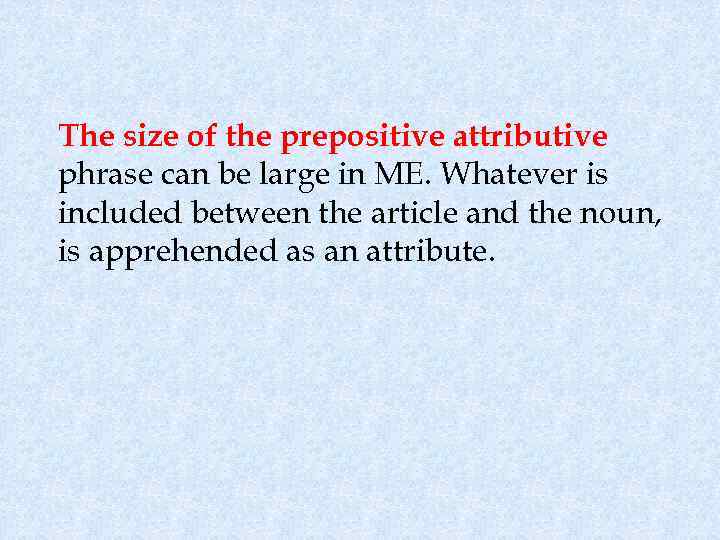 The size of the prepositive attributive phrase can be large in ME. Whatever is included between the article and the noun, is apprehended as an attribute.
The size of the prepositive attributive phrase can be large in ME. Whatever is included between the article and the noun, is apprehended as an attribute.
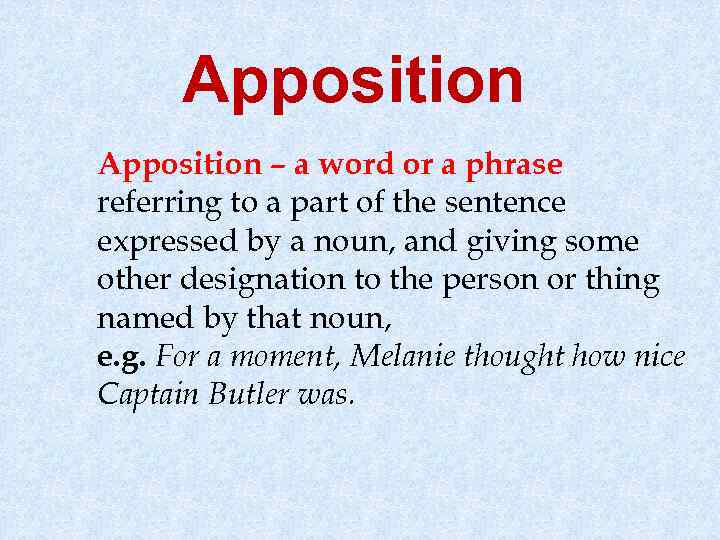 Apposition – a word or a phrase referring to a part of the sentence expressed by a noun, and giving some other designation to the person or thing named by that noun, e. g. For a moment, Melanie thought how nice Captain Butler was.
Apposition – a word or a phrase referring to a part of the sentence expressed by a noun, and giving some other designation to the person or thing named by that noun, e. g. For a moment, Melanie thought how nice Captain Butler was.
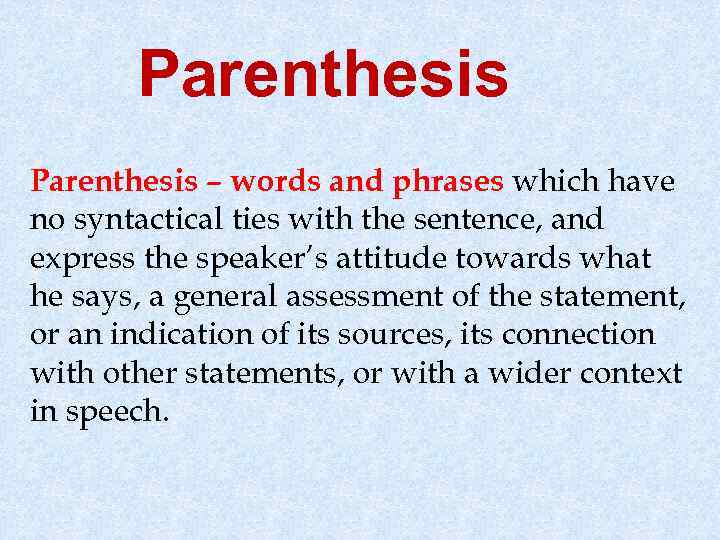 Parenthesis – words and phrases which have no syntactical ties with the sentence, and express the speaker’s attitude towards what he says, a general assessment of the statement, or an indication of its sources, its connection with other statements, or with a wider context in speech.
Parenthesis – words and phrases which have no syntactical ties with the sentence, and express the speaker’s attitude towards what he says, a general assessment of the statement, or an indication of its sources, its connection with other statements, or with a wider context in speech.
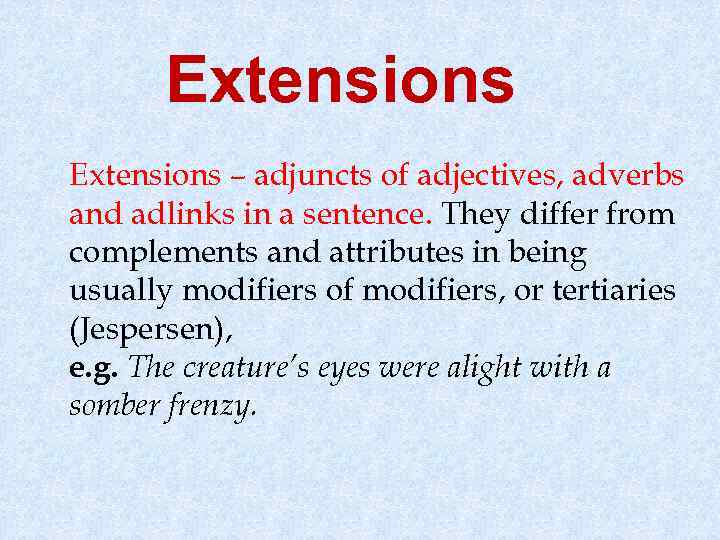 Extensions – adjuncts of adjectives, adverbs and adlinks in a sentence. They differ from complements and attributes in being usually modifiers of modifiers, or tertiaries (Jespersen), e. g. The creature’s eyes were alight with a somber frenzy.
Extensions – adjuncts of adjectives, adverbs and adlinks in a sentence. They differ from complements and attributes in being usually modifiers of modifiers, or tertiaries (Jespersen), e. g. The creature’s eyes were alight with a somber frenzy.
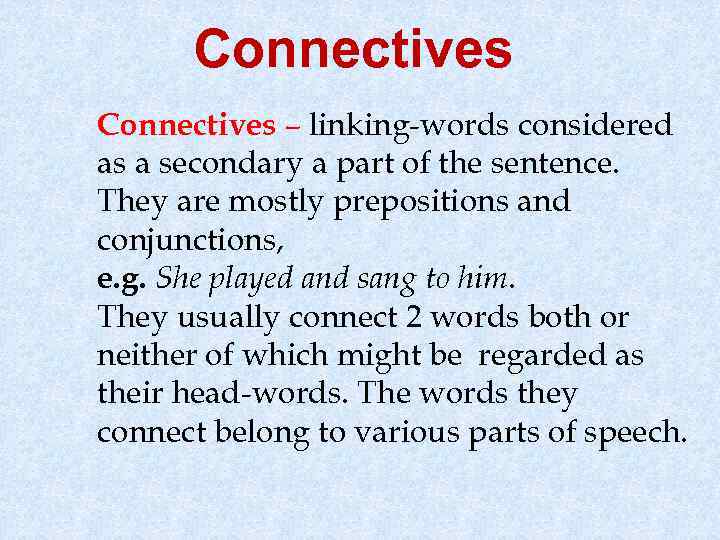 Connectives – linking-words considered as a secondary a part of the sentence. They are mostly prepositions and conjunctions, e. g. She played and sang to him. They usually connect 2 words both or neither of which might be regarded as their head-words. The words they connect belong to various parts of speech.
Connectives – linking-words considered as a secondary a part of the sentence. They are mostly prepositions and conjunctions, e. g. She played and sang to him. They usually connect 2 words both or neither of which might be regarded as their head-words. The words they connect belong to various parts of speech.
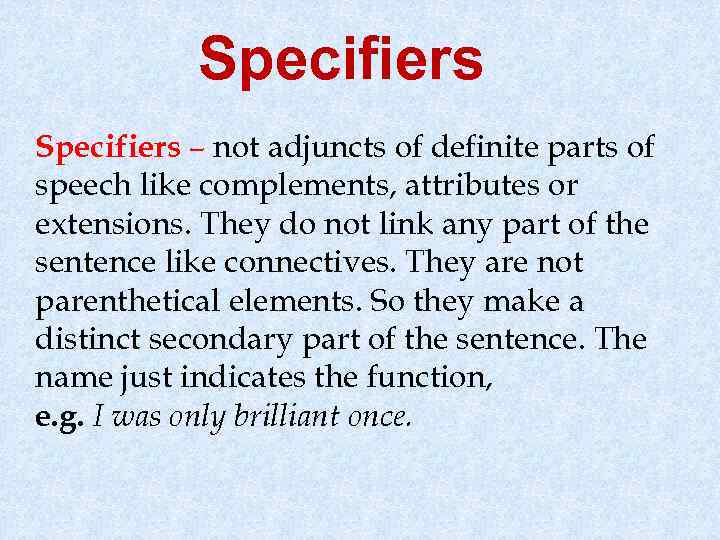 Specifiers – not adjuncts of definite parts of speech like complements, attributes or extensions. They do not link any part of the sentence like connectives. They are not parenthetical elements. So they make a distinct secondary part of the sentence. The name just indicates the function, e. g. I was only brilliant once.
Specifiers – not adjuncts of definite parts of speech like complements, attributes or extensions. They do not link any part of the sentence like connectives. They are not parenthetical elements. So they make a distinct secondary part of the sentence. The name just indicates the function, e. g. I was only brilliant once.
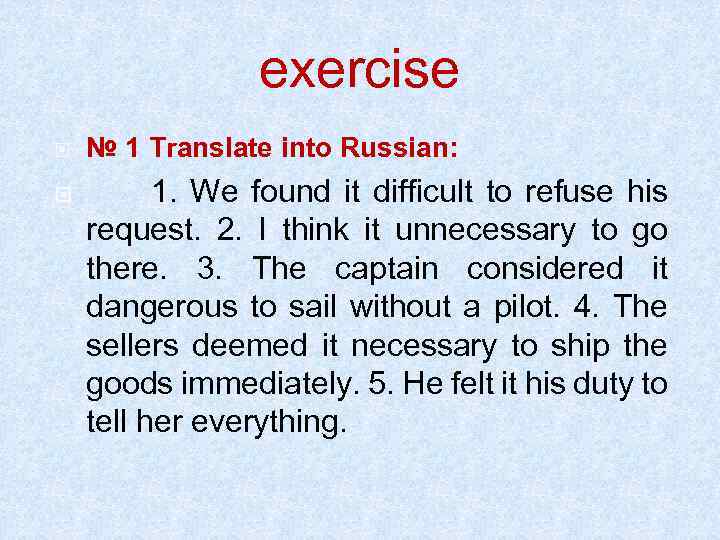 exercise № 1 Translate into Russian: 1. We found it difficult to refuse his request. 2. I think it unnecessary to go there. 3. The captain considered it dangerous to sail without a pilot. 4. The sellers deemed it necessary to ship the goods immediately. 5. He felt it his duty to tell her everything.
exercise № 1 Translate into Russian: 1. We found it difficult to refuse his request. 2. I think it unnecessary to go there. 3. The captain considered it dangerous to sail without a pilot. 4. The sellers deemed it necessary to ship the goods immediately. 5. He felt it his duty to tell her everything.
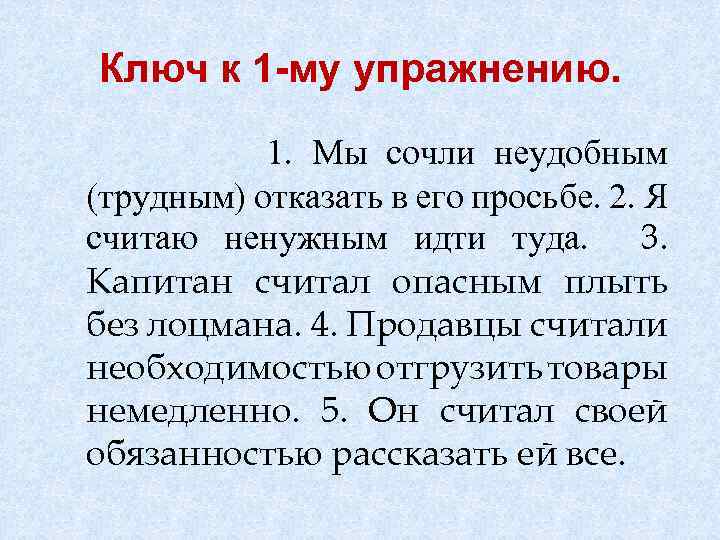 Ключ к 1 -му упражнению. 1. Мы сочли неудобным (трудным) отказать в его просьбе. 2. Я считаю ненужным идти туда. 3. Капитан считал опасным плыть без лоцмана. 4. Продавцы считали необходимостью отгрузить товары немедленно. 5. Он считал своей обязанностью рассказать ей все.
Ключ к 1 -му упражнению. 1. Мы сочли неудобным (трудным) отказать в его просьбе. 2. Я считаю ненужным идти туда. 3. Капитан считал опасным плыть без лоцмана. 4. Продавцы считали необходимостью отгрузить товары немедленно. 5. Он считал своей обязанностью рассказать ей все.
 № 2 Specify direct object, indirect object and prepositional object in following offers and define, than they are expressed: 1. The whole country has been taking part in the restoration 2. The U. S. A. is rapidly developing its productive forces. 3. The fascist invaders caused the collective farms enormous damage. 4. We have equipped the plant with powerful machines. 5. We have sent them our illustrated catalogues. 6. We have referred the matter to arbitration. 7. Tell me where to put the trunk. 8. I wish you success. 9. I have received a letter from my brother.
№ 2 Specify direct object, indirect object and prepositional object in following offers and define, than they are expressed: 1. The whole country has been taking part in the restoration 2. The U. S. A. is rapidly developing its productive forces. 3. The fascist invaders caused the collective farms enormous damage. 4. We have equipped the plant with powerful machines. 5. We have sent them our illustrated catalogues. 6. We have referred the matter to arbitration. 7. Tell me where to put the trunk. 8. I wish you success. 9. I have received a letter from my brother.
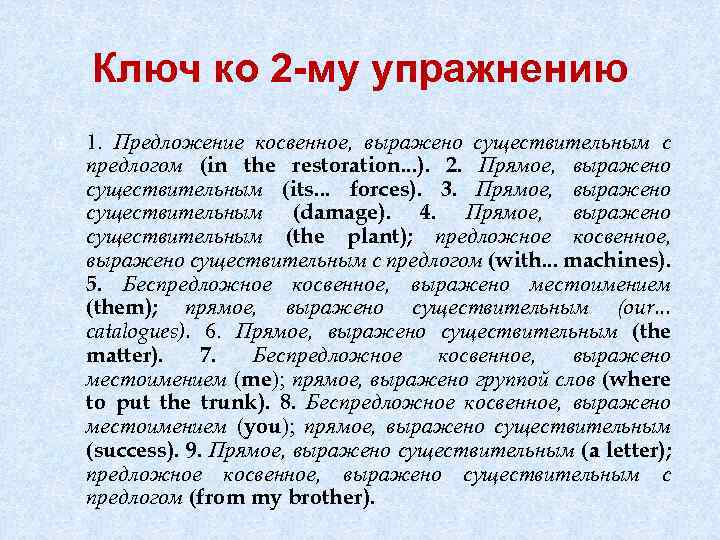 Ключ ко 2 -му упражнению 1. Предложение косвенное, выражено существительным с предлогом (in the restoration. . . ). 2. Прямое, выражено существительным (its. . . forces). 3. Прямое, выражено существительным (damage). 4. Прямое, выражено существительным (the plant); предложное косвенное, выражено существительным с предлогом (with. . . machines). 5. Беспредложное косвенное, выражено местоимением (them); прямое, выражено существительным (our. . . catalogues). 6. Прямое, выражено существительным (the matter). 7. Беспредложное косвенное, выражено местоимением (me); прямое, выражено группой слов (where to put the trunk). 8. Беспредложное косвенное, выражено местоимением (you); прямое, выражено существительным (success). 9. Прямое, выражено существительным (a letter); предложное косвенное, выражено существительным с предлогом (from my brother).
Ключ ко 2 -му упражнению 1. Предложение косвенное, выражено существительным с предлогом (in the restoration. . . ). 2. Прямое, выражено существительным (its. . . forces). 3. Прямое, выражено существительным (damage). 4. Прямое, выражено существительным (the plant); предложное косвенное, выражено существительным с предлогом (with. . . machines). 5. Беспредложное косвенное, выражено местоимением (them); прямое, выражено существительным (our. . . catalogues). 6. Прямое, выражено существительным (the matter). 7. Беспредложное косвенное, выражено местоимением (me); прямое, выражено группой слов (where to put the trunk). 8. Беспредложное косвенное, выражено местоимением (you); прямое, выражено существительным (success). 9. Прямое, выражено существительным (a letter); предложное косвенное, выражено существительным с предлогом (from my brother).
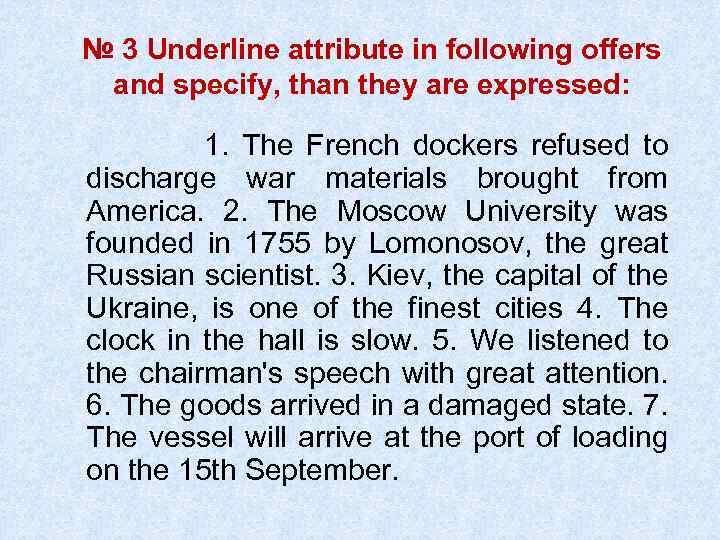 № 3 Underline attribute in following offers and specify, than they are expressed: 1. The French dockers refused to discharge war materials brought from America. 2. The Moscow University was founded in 1755 by Lomonosov, the great Russian scientist. 3. Kiev, the capital of the Ukraine, is one of the finest cities 4. The clock in the hall is slow. 5. We listened to the chairman's speech with great attention. 6. The goods arrived in a damaged state. 7. The vessel will arrive at the port of loading on the 15 th September.
№ 3 Underline attribute in following offers and specify, than they are expressed: 1. The French dockers refused to discharge war materials brought from America. 2. The Moscow University was founded in 1755 by Lomonosov, the great Russian scientist. 3. Kiev, the capital of the Ukraine, is one of the finest cities 4. The clock in the hall is slow. 5. We listened to the chairman's speech with great attention. 6. The goods arrived in a damaged state. 7. The vessel will arrive at the port of loading on the 15 th September.
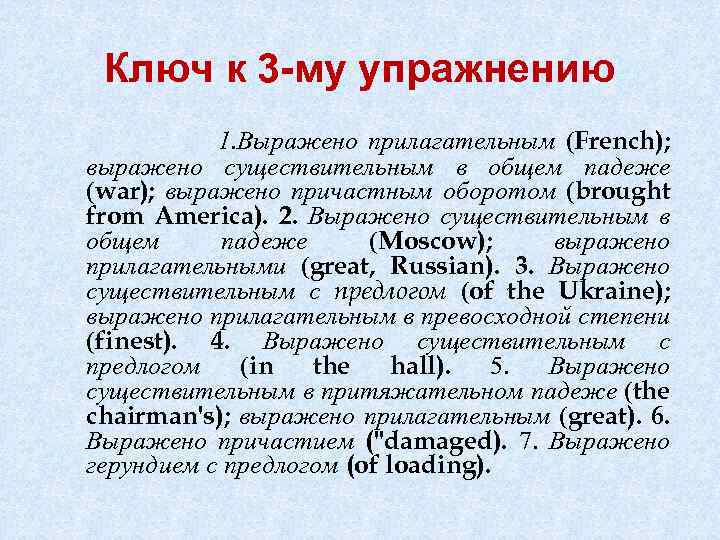 Ключ к 3 -му упражнению 1. Выражено прилагательным (French); выражено существительным в общем падеже (war); выражено причастным оборотом (brought from America). 2. Выражено существительным в общем падеже (Moscow); выражено прилагательными (great, Russian). 3. Выражено существительным с предлогом (of the Ukraine); выражено прилагательным в превосходной степени (finest). 4. Выражено существительным с предлогом (in the hall). 5. Выражено существительным в притяжательном падеже (the chairman's); выражено прилагательным (great). 6. Выражено причастием ("damaged). 7. Выражено герундием с предлогом (of loading).
Ключ к 3 -му упражнению 1. Выражено прилагательным (French); выражено существительным в общем падеже (war); выражено причастным оборотом (brought from America). 2. Выражено существительным в общем падеже (Moscow); выражено прилагательными (great, Russian). 3. Выражено существительным с предлогом (of the Ukraine); выражено прилагательным в превосходной степени (finest). 4. Выражено существительным с предлогом (in the hall). 5. Выражено существительным в притяжательном падеже (the chairman's); выражено прилагательным (great). 6. Выражено причастием ("damaged). 7. Выражено герундием с предлогом (of loading).
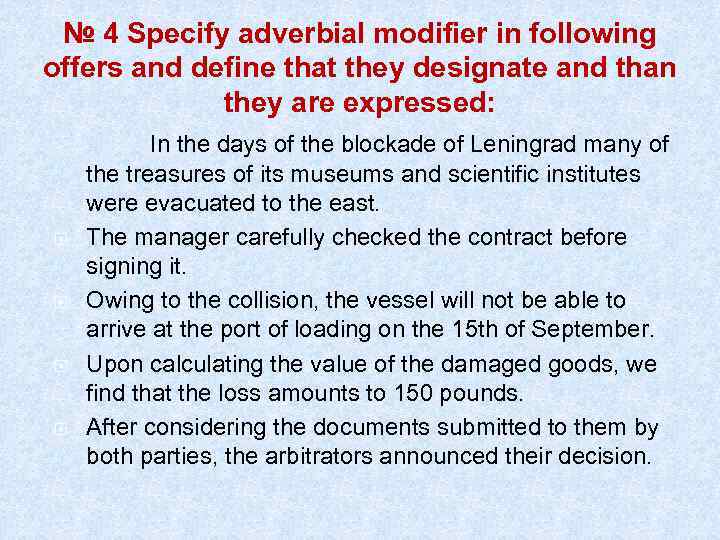 № 4 Specify adverbial modifier in following offers and define that they designate and than they are expressed: In the days of the blockade of Leningrad many of the treasures of its museums and scientific institutes were evacuated to the east. The manager carefully checked the contract before signing it. Owing to the collision, the vessel will not be able to arrive at the port of loading on the 15 th of September. Upon calculating the value of the damaged goods, we find that the loss amounts to 150 pounds. After considering the documents submitted to them by both parties, the arbitrators announced their decision.
№ 4 Specify adverbial modifier in following offers and define that they designate and than they are expressed: In the days of the blockade of Leningrad many of the treasures of its museums and scientific institutes were evacuated to the east. The manager carefully checked the contract before signing it. Owing to the collision, the vessel will not be able to arrive at the port of loading on the 15 th of September. Upon calculating the value of the damaged goods, we find that the loss amounts to 150 pounds. After considering the documents submitted to them by both parties, the arbitrators announced their decision.
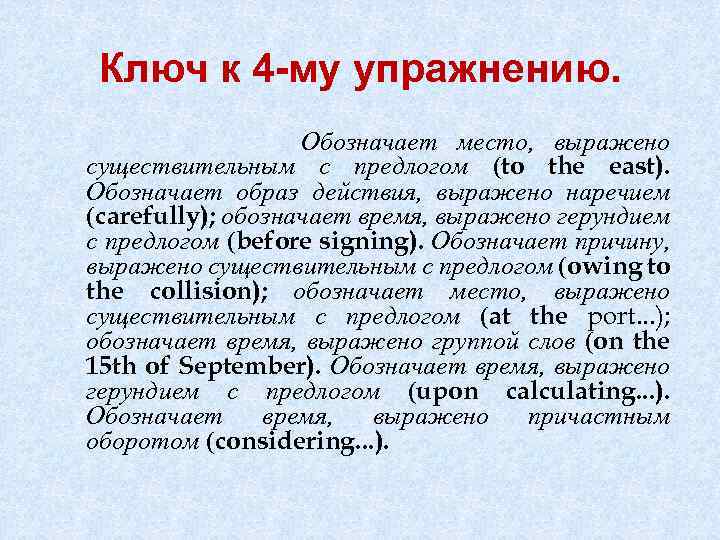 Ключ к 4 -му упражнению. Обозначает место, выражено существительным с предлогом (to the east). Обозначает образ действия, выражено наречием (carefully); обозначает время, выражено герундием с предлогом (before signing). Обозначает причину, выражено существительным с предлогом (owing to the collision); обозначает место, выражено существительным с предлогом (at the port. . . ); обозначает время, выражено группой слов (on the 15 th of September). Обозначает время, выражено герундием с предлогом (upon calculating. . . ). Обозначает время, выражено причастным оборотом (considering. . . ).
Ключ к 4 -му упражнению. Обозначает место, выражено существительным с предлогом (to the east). Обозначает образ действия, выражено наречием (carefully); обозначает время, выражено герундием с предлогом (before signing). Обозначает причину, выражено существительным с предлогом (owing to the collision); обозначает место, выражено существительным с предлогом (at the port. . . ); обозначает время, выражено группой слов (on the 15 th of September). Обозначает время, выражено герундием с предлогом (upon calculating. . . ). Обозначает время, выражено причастным оборотом (considering. . . ).
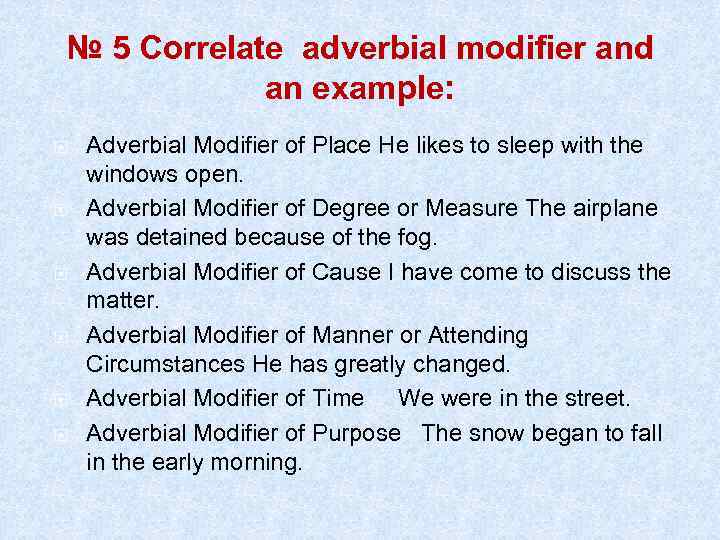 № 5 Correlate adverbial modifier and an example: Adverbial Modifier of Place Не likes to sleep with the windows open. Adverbial Modifier of Degree or Measure The airplane was detained because of the fog. Adverbial Modifier of Cause I have come to discuss the matter. Adverbial Modifier of Manner or Attending Circumstances He has greatly changed. Adverbial Modifier of Time We were in the street. Adverbial Modifier of Purpose The snow began to fall in the early morning.
№ 5 Correlate adverbial modifier and an example: Adverbial Modifier of Place Не likes to sleep with the windows open. Adverbial Modifier of Degree or Measure The airplane was detained because of the fog. Adverbial Modifier of Cause I have come to discuss the matter. Adverbial Modifier of Manner or Attending Circumstances He has greatly changed. Adverbial Modifier of Time We were in the street. Adverbial Modifier of Purpose The snow began to fall in the early morning.
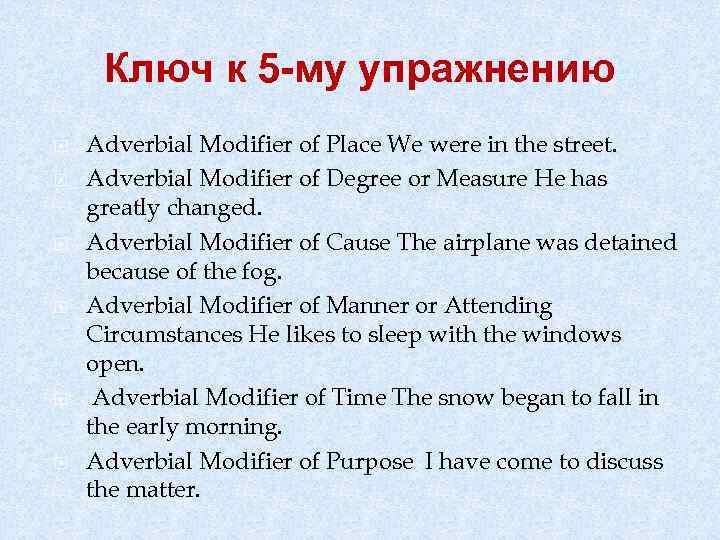 Ключ к 5 -му упражнению Adverbial Modifier of Place We were in the street. Adverbial Modifier of Degree or Measure He has greatly changed. Adverbial Modifier of Cause The airplane was detained because of the fog. Adverbial Modifier of Manner or Attending Circumstances Не likes to sleep with the windows open. Adverbial Modifier of Time The snow began to fall in the early morning. Adverbial Modifier of Purpose I have come to discuss the matter.
Ключ к 5 -му упражнению Adverbial Modifier of Place We were in the street. Adverbial Modifier of Degree or Measure He has greatly changed. Adverbial Modifier of Cause The airplane was detained because of the fog. Adverbial Modifier of Manner or Attending Circumstances Не likes to sleep with the windows open. Adverbial Modifier of Time The snow began to fall in the early morning. Adverbial Modifier of Purpose I have come to discuss the matter.


